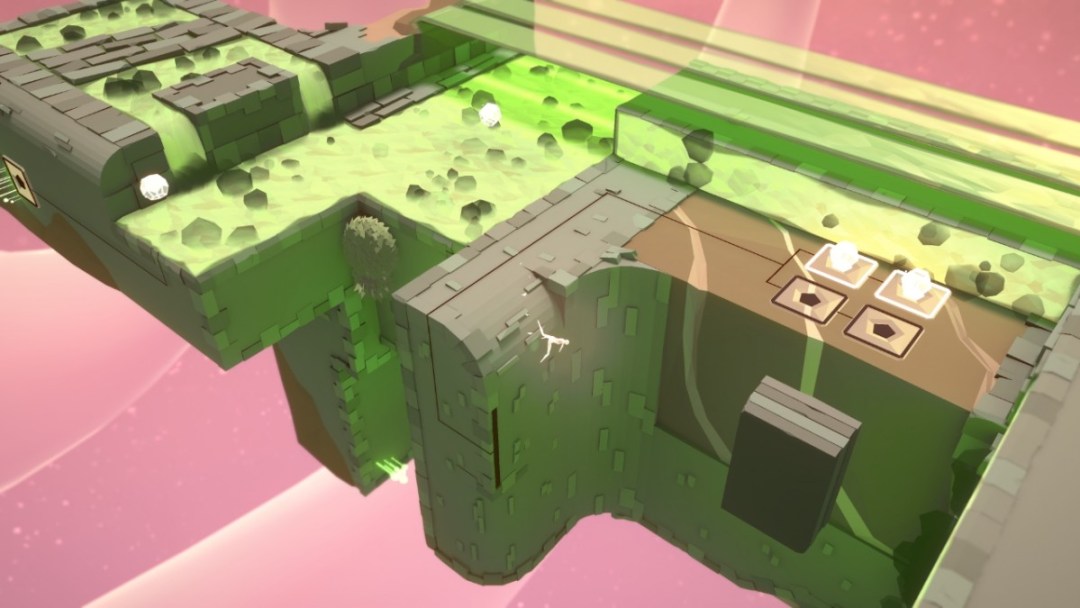I like a good puzzler, especially when it does something that feels particularly unique to the genre. Etherborn, the debut release from Spanish developer Altered Matter, does just that, with its Escher-inspired puzzles challenging players to defy both gravity and logic throughout its selection of tricky enigmas. Whilst it’s certainly a clever game though, there are some elements of Etherborn’s design that can make it feel more frustrating than exacting on occasions.
Etherborn’s gameplay sees you working across a series of topsy-turvy levels in a very pretty world where the rules of gravity are broken, with the player able to walk across any pathway or wall as long as it follows across a curved surface. It’s up to you to make your way to the end of the level, all whilst collecting glowing orbs that help you open up new pathways and utilising the shifting gravity to jump between the different platforms that are littered across each level – that might sound a little complicated, but honestly, the concept is very easy to understand in-game. That doesn’t mean that the game itself is easy though, and you can expect to spend plenty of time scratching your head trying to figure out each situation before that ‘eureka!’ moment hits and you find yourself progressing a little bit further.

As you can imagine in a game that allows you to break the rules of gravity, you’re going to fall to your doom on quite a few occasions in Etherborn. Thankfully, respawns are pretty much instantaneous, so you’re never kept out of the game for too long nor are you ever sent that far back. It’s a good thing too because a lot of your success in the game will come down to trial and error – whilst there are certainly moments in the game where all it takes is a bit of clever thinking to progress, sometimes just trying ideas over and over until they work is just as effective.
That being said, sometimes you’ll know where exactly you need to go but will struggle to find out how to get there. Whilst this is often thanks to the game’s clever puzzle design, it could also be because of a lack of any distinguishable landmarks. Each level in Etherborn is pretty big and naturally you’ll have to look at it from across multiple angles to see everything, but the fact that you’re constantly shifting gravity means that it’s easy to lose track of where exactly you are. Not having anything there to remind you or for you to recognise means it’s easy to jump to the completely wrong place and have to start a puzzle over from scratch. Of course, this problem could just be down to me not paying enough attention, but the way that the camera shifts around freely as you defy gravity could make it a little bit too easy to lose track of your position.

Precision is also key in Etherborn; one wrong move when lingering near the edge of a platform can see the puzzle-solving protagonist quickly fall to their doom. This could actually be a little irritating, especially since the controls of the game can be a bit flimsy. Sure, it’s easy enough to get around and in fairness jumping felt precise, but when you start running you move with such large strides that it’s easy to accidentally step over a platform. It’s a little bit of a nuisance early on, but can become particularly annoying during some of the more difficult platforming-heavy levels. Admittedly, a lot of these falls were probably down to my own errors, but it is clear that there’s a lack of precision in player movement.
Whilst it does have its flaws, there’s no denying that the puzzles in the game are very clever in design and that a lot of thought has clearly gone into sculpting them. Figuring out where and where to use the orbs and then finding the right platforms to jump to is satisfying, as is figuring out the missing piece of a puzzle after being stumped for some time. It’s one of those puzzle games that makes you FEEL clever as you’re playing, which is always a good thing in my eyes. It’s just a shame that some of the design choices of the actual gameplay works against you a little too often.
Summary
Etherborn is a satisfying puzzler that has some very cleverly designed enigmas, but unfortunately some awkward gameplay mechanics hold it back a bit. It’s not that anything in the game is bad by any stretch of the imagination, but the loose controls and some samey environments do make solving some puzzles feel a lot less enjoyable than it should be.
Fans of puzzlers will definitely have a good time with Etherborn though, so if you fancy taking part in some brain teasers it’s certainly worth checking out. Those who aren’t too keen though might just find themselves getting a little too frustrated with some of the game’s shortcomings.
Developer: Altered Matter
Publisher: Altered Matter
Platform(s): Nintendo Switch (Reviewed), PlayStation 4, Xbox One, PC





